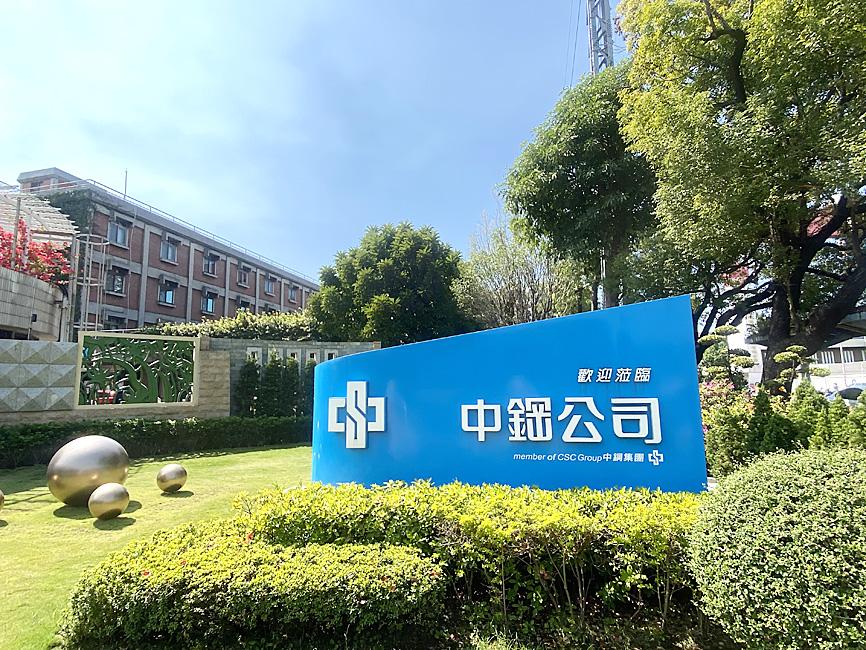China Steel Corp (CSC, 中鋼) plans to impose a moderate carbon surcharge on steel exports in August next year ahead of the implementation of new EU carbon rules, it said yesterday.
A draft version of the EU’s Carbon Border Adjustment Mechanism is to be released in 2023 and implemented in 2026, affecting 248 items including steel, the company said.
Even though only about 3 percent of CSC’s products are exported to Europe, the company is taking the issue seriously and aims to minimize the impact on Taiwan’s steel industry, as the rules would have a more profound effect on downstream companies, it said.

Photo: Hung Chen-hung, Taipei Times
CSC only ships about 330,000 tonnes of steel to Europe each year, but the new regulations could disproportionately affect its downstream customers who have more exposure to the European market, it added.
CSC executive vice president and spokesman Hwang Chien-chih (黃建智) said the company is looking to impose a carbon surcharge in August next year, but details of the scheme, including how much the surcharge would be, have not yet been finalized.
“The first challenge is to actually calculate the carbon footprint of all our products,” Huang said.
Other major economies such as the US and China are also expected to soon adopt their own carbon pricing schemes, he said.
“CSC not only has to come up with a carbon pricing scheme, we have to do so in a way that is transparent and recognized worldwide,” Huang said.
The company is looking to Germany’s ThyssenKrupp AG as an example in imposing a carbon surcharge, it said.

‘SWASTICAR’: Tesla CEO Elon Musk’s close association with Donald Trump has prompted opponents to brand him a ‘Nazi’ and resulted in a dramatic drop in sales Demonstrators descended on Tesla Inc dealerships across the US, and in Europe and Canada on Saturday to protest company chief Elon Musk, who has amassed extraordinary power as a top adviser to US President Donald Trump. Waving signs with messages such as “Musk is stealing our money” and “Reclaim our country,” the protests largely took place peacefully following fiery episodes of vandalism on Tesla vehicles, dealerships and other facilities in recent weeks that US officials have denounced as terrorism. Hundreds rallied on Saturday outside the Tesla dealership in Manhattan. Some blasted Musk, the world’s richest man, while others demanded the shuttering of his

ADVERSARIES: The new list includes 11 entities in China and one in Taiwan, which is a local branch of Chinese cloud computing firm Inspur Group The US added dozens of entities to a trade blacklist on Tuesday, the US Department of Commerce said, in part to disrupt Beijing’s artificial intelligence (AI) and advanced computing capabilities. The action affects 80 entities from countries including China, the United Arab Emirates and Iran, with the commerce department citing their “activities contrary to US national security and foreign policy.” Those added to the “entity list” are restricted from obtaining US items and technologies without government authorization. “We will not allow adversaries to exploit American technology to bolster their own militaries and threaten American lives,” US Secretary of Commerce Howard Lutnick said. The entities

Minister of Finance Chuang Tsui-yun (莊翠雲) yesterday told lawmakers that she “would not speculate,” but a “response plan” has been prepared in case Taiwan is targeted by US President Donald Trump’s reciprocal tariffs, which are to be announced on Wednesday next week. The Trump administration, including US Secretary of the Treasury Scott Bessent, has said that much of the proposed reciprocal tariffs would focus on the 15 countries that have the highest trade surpluses with the US. Bessent has referred to those countries as the “dirty 15,” but has not named them. Last year, Taiwan’s US$73.9 billion trade surplus with the US

Taiwan’s official purchasing managers’ index (PMI) last month rose 0.2 percentage points to 54.2, in a second consecutive month of expansion, thanks to front-loading demand intended to avoid potential US tariff hikes, the Chung-Hua Institution for Economic Research (CIER, 中華經濟研究院) said yesterday. While short-term demand appeared robust, uncertainties rose due to US President Donald Trump’s unpredictable trade policy, CIER president Lien Hsien-ming (連賢明) told a news conference in Taipei. Taiwan’s economy this year would be characterized by high-level fluctuations and the volatility would be wilder than most expect, Lien said Demand for electronics, particularly semiconductors, continues to benefit from US technology giants’ effort